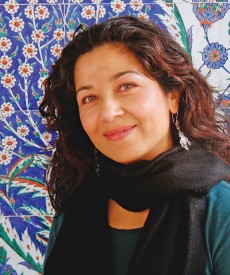 Social Sciences
Social Sciences
How Can ISIS Happen?

Many in the West predicted that Syrian President Bashar Hafez al-Assad would fall along with numerous other Middle East leaders toppled during the Arab Spring uprisings earlier this decade.
But Angela Joya (right) wasn’t one of them.
The new assistant professor of international studies knows that the reality on the ground in Syria is much more complicated than is typically portrayed in US newspapers. And that reality helps explain how some segments of the population look for solutions from the extremist group ISIS, or Islamic State of Iraq and Syria.
According to Joya, the Syrian president and his Ba’ath Party—though accused of brutal crackdowns—also enjoy a level of support among everyday Syrians. Despite the political chaos and violence within the region and country, the government has maintained basic services and a tolerable quality of life outside active war zones.
“Those are things that are not really covered in the outside media,” Joya said. “(The crackdowns) are one reality. There is also the fact that the government is still managing to take care of its people to some degree. That’s why you don’t see those anti-Assad voices being so strong.”
Joya’s recent appointment represented a two-for-one victory for the international studies department. She is an expert on the Middle East as well as a political economist, both areas in which the department wanted growth.
Political economy isn’t a field of study. It’s a way to assess change in a country by way of examining its economic systems, government and the roles of both powerful and marginalized groups. “It’s a toolkit we use to study transformative processes such as globalization,” Joya said. “We’re enabling students to have a critical eye for understanding the actors who are involved.”
Of late, Joya has concentrated on Egypt and Syria, countries in stark contrast when it comes to political upheaval and reform.
Egypt, for Joya, represents an enormous missed opportunity.
The Arab Spring uprising of 2011 that overturned ruler Hosni Mubarak in just 18 days brought the promise of a more inclusive government. But the Islamist Muslim Brotherhood that rode the uprising to power had no real vision for Egypt and was itself toppled by protests within a year; it’s been replaced by military-backed President Abdel Fattah el-Sisi and a return to policies that were the cause of the country’s tumult in the first place.
“Despite the demands of the people, it seems Egypt is going back to reliance on the International Monetary Fund for loans and subsidies with onerous conditions,” Joya said. “Ordinary people will face the same hardships they faced under Mubarak.”
In Syria, meanwhile, there was, at best, ambivalence for the Arab Spring uprisings, which many viewed as destabilizing and disruptive for day-to-day life, Joya said.
That’s because, in contrast to other countries in the region, Syria’s leadership—both Bashar al-Assad and his predecessor, Hafez al-Assad—historically “kept the lid” on sweeping calls for reform by providing enough basic services to keep workers, peasants and other Syrians happy, Joya said.
Meanwhile, those who don’t favor Assad have few alternatives. The Syrian opposition to the president is divided and lacks any sort of political or economic vision, having squelched any momentum gained during the recent regional upheaval, Joya said.
Especially worrisome to Joya is that some younger Syrians place hope in the extremist group ISIS.
Though Syrians condemn the group’s barbaric attacks on Westerners, some are so desperate for change—and frustrated by the history of US actions in the Middle East—that they see the group as a noble force trying to drive out occupiers. The hope is misplaced, Joya added, because ISIS is only tearing the country apart as it battles Assad for power.
Can the US be part of a better future in the Middle East?
Not if it maintains its wrong-headed reliance on military tactics to effect change, Joya says. Building relationships with grassroots organizations and working to improve the lives of average citizens would help shift how the West is perceived in the region, she added.
—Matt Cooper


 Twitter
Twitter Facebook
Facebook Forward
Forward